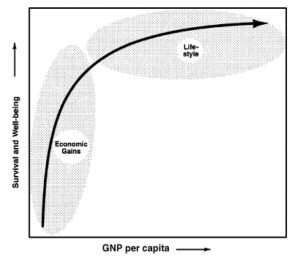Developed by Katie Brown in coordination with Ronald Inglehart.
The World Values Survey tracks values and cultural change over time and across the world. Conducted in five waves from 1981 to 2007 – with a sixth wave being collected now – the survey samples from 90% of the world’s population.
The World Values Survey is especially interested in human empowerment. To map the process of empowerment, World Values Survey researchers created the Utility Ladder of Freedoms. Climbing the ladder means moving from a life based in threats to a life based in opportunity. Nations can climb the ladder as their citizens have more ways to improve their daily lives, like education. Typically, the higher a nation climbs on the ladder, the more universal freedoms are tolerated and practiced within that nation. Here, we use the ladder to take a closer look at the country of Turkey.
In August 2013, the Center for Political Studies (CPS) Blog featured a post about the protests in Turkey, suggesting that the government’s violent response was related to Turkey’s weak democracy. Since that time, the protests in Turkey have settled down. However, Turkey’s bid to host the 2020 Olympics has replayed some of these earlier tensions. Some have expressed that the political transformation and violence would make the selection of Turkey a risky choice. After Japan was instead selected to host the 2020 Olympics, some Turkish citizens actually celebrated, using the opportunity to criticize the Turkish government.
So, where is Turkey in its climb up the Utility Ladder of Freedoms?
 Let’s start with Happiness. The World Values Survey asks about happiness and life satisfaction – what we’ll call Subjective Well Being. An article by CPS Researcher Inglehart, Roberto Foa of Harvard University, the late pioneer of positive psychology Christopher Peterson, and Christian Welzel of Germany’s Leuphana University, looks at the determinants of Subjective Well Being. As the chart to the left shows, Subjective Well Being rises very quickly as Gross Domestic Product (GDP) rises, but then levels off. An earlier Inglehart study from 1991 also finds a connection between GDP and life satisfaction. So, earning more money means higher well being, but only to a point.
Let’s start with Happiness. The World Values Survey asks about happiness and life satisfaction – what we’ll call Subjective Well Being. An article by CPS Researcher Inglehart, Roberto Foa of Harvard University, the late pioneer of positive psychology Christopher Peterson, and Christian Welzel of Germany’s Leuphana University, looks at the determinants of Subjective Well Being. As the chart to the left shows, Subjective Well Being rises very quickly as Gross Domestic Product (GDP) rises, but then levels off. An earlier Inglehart study from 1991 also finds a connection between GDP and life satisfaction. So, earning more money means higher well being, but only to a point.
Now let’s consider Turkey. The graph below plots the GDP of specific countries against their reported Subjective Well Being. Turkey has a lower GDP and a Subjective Well Being at the mid-point between survival and well being. Inglehart’s earlier work finds that the as Subjective Well Being increases, so does democratic potential. So, Turkey’s mid-level happiness correlates with its weak democracy.
Subjective Well Being vs. GDP
But, Turkey’s Subjective Well Being is on the rise. The chart below shows that Turkey’s Subjective Well Being is increasing faster than most other nations. By that logic, Turkey’s democratic potential should also be on the rise.
Subjective Well Being
Position on the Utility Ladder of Freedoms depends on choice, equality, autonomy, and voice – all qualities that also act as keys to democracy. Turkey’s Subjective Well Being and its potential for democracy are on the rise. So, Turkey seems poised to climb the ladder. However, the sometimes disconnect between the country’s government and citizens, occasionally to violent ends, suggests that moving up the ladder can be a rough climb.



